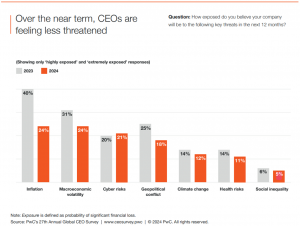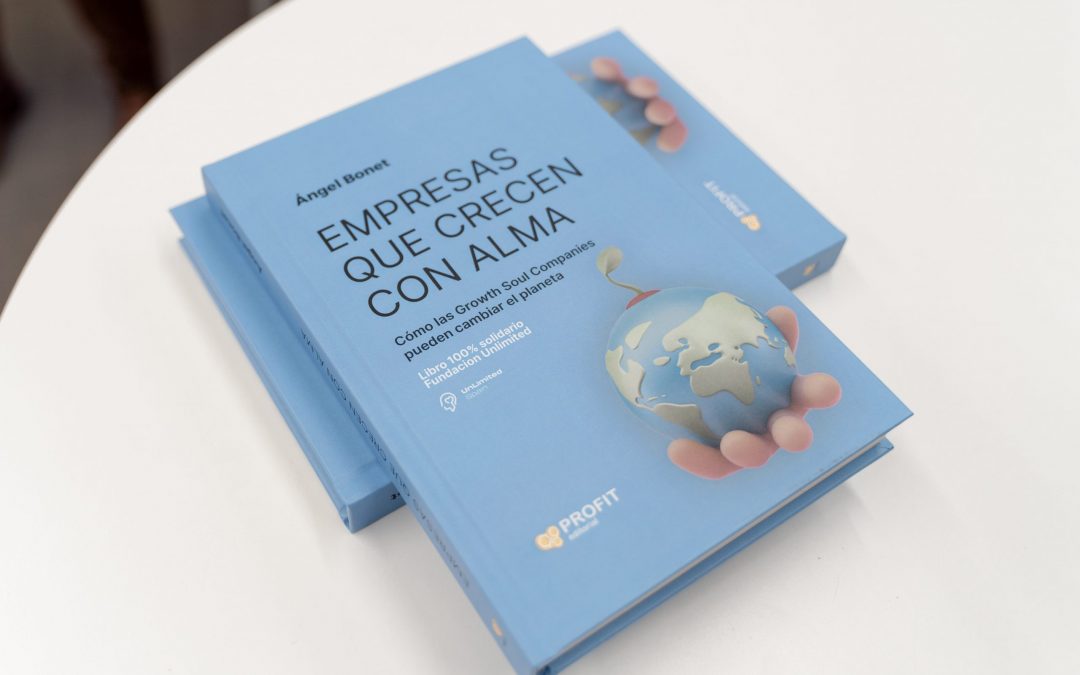The latest study published by PwC on global CEOs, “Thriving in an Age of Continuous Reinvention,” only confirms my worst fears. They are not working to address the world’s major problems, but rather to keep their shareholders happy in the short term. Paradoxically, twelve months ago, the same study reported that almost 40% of global CEOs believed their companies would no longer be viable within ten years if they continued on their current path. The imperative for reinvention that this implied caught my attention. Almost invariably, when anticipating the magnitude of the changes ahead, these leaders concluded that they needed to be more transformative in their approach for their organizations to thrive in the coming decades. But the reality is that this is not happening:

Inflation remains the primary concern for U.S. CEOs, despite its decline in expected exposure for global CEOs overall. Similarly, geopolitical threats remain among the top concerns for CEOs in Central and Eastern Europe, as well as the Middle East, even though these concerns have lessened for global CEOs in general. This may be because companies have already taken steps to shield themselves from the effects of certain conflicts, and the full impact of others remains unclear. In Western Europe, CEOs are more concerned about cyber risk in the next 12 months. This is particularly true in France and Germany, where it is perceived as the top threat. U.S. CEOs also rank cyber risk exposure high on their list of concerns. As for the planet? Nothing. In fact, concern has decreased.
How are we going to make companies engines of social and environmental well-being if all their top executives continue to see the world through such a short-term lens?
Nevertheless, about two-thirds have efforts underway to improve energy efficiency; another 10% report having completed such initiatives; and about half say they have ongoing projects to innovate climate-friendly products and services. Western European CEOs are more likely to have energy efficiency and climate-oriented innovation initiatives either in progress or completed. And CEOs worldwide are accepting lower rates of return for climate-friendly investments, as we’ll see later. However, too many CEOs report having no plans for other climate actions. For example, less than half of respondents have incorporated climate risk into financial planning, and nearly a third have no plans to do so.

As for social issues, it’s better not to even mention them until there is a taxonomy and stricter regulation in place.
In conclusion, I have to acknowledge that this report once again confirms that we have a lot of work ahead of us. Only business leaders with both soul and vision will be able to lead the complex but essential path toward a purpose-driven economy.
Source: PwC’s 27th Annual Global CEO Survey
Corruption digging its own trenches: from the “3%” to the urgency of a purpose-driven economy
Since Spain regained democracy in 1978, the hope for a fairer, more modern, and transparent country has been repeatedly shaken by the long shadow of corruption. And not just occasional or anecdotal...
Quantum computing: the brain of the future in service of the planet
Throughout human history, few technological revolutions have promised as much as quantum computing. Often surrounded by mystery due to its scientific complexity, this emerging technology is set to...
The silent cancer of nepotism: how politics and big corporations are killing society’s progress
I’ve always been outraged by how many people reach top positions in companies — and especially in politics — not because of their abilities or merits, but thanks to their contacts, last names, or...




